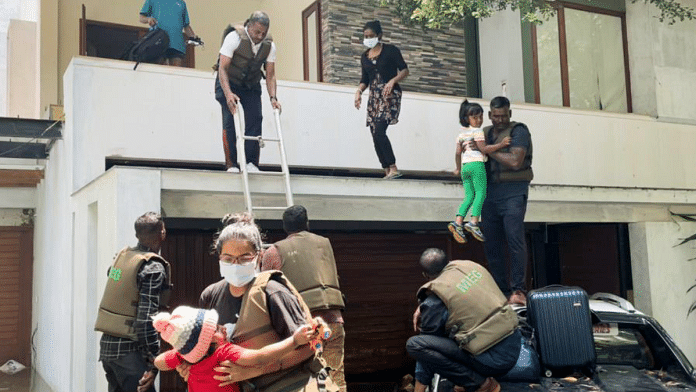New Delhi: The Ministry of Housing and Urban Affairs (MoHUA) intends to push states and UTs to integrate drainage management plan with master plans of cities under the City Investments to Innovate, Integrate and Sustain (CITIIS 2.0) programme for checking the problem of urban flooding, ThePrint has learnt.
Launched Thursday by Union housing and urban affairs minister Hardeep Singh Puri, the CITIIS 2.0 focuses on helping states and Union Territories adopt data-driven planning and implementation of climate action plans apart from other measures.
Referring to the growing concern over urban flooding, MoHUA secretary Manoj Joshi said various aspects of climate change and its impact is a matter of concern. Delhi, Bengaluru, Chennai and other cities have faced urban flooding in the past few years, he said.
“We are seeing an increasing phenomenon of concentrated rain in a few days, leading to flooding in city after city. This CITIIS 2.0 project focuses on (this aspect). When cities prepare their Master Plan, they need to work on drainage management and flood management and prepare a proper plan…Our increasing focus on climate-related work is coming under CITIIS 2.0,” Joshi said at the launch of the programme.
Cities have to gear up to address problems related to climate change for which data-oriented planning and focused interventions are needed, ministry officials said.
“The programme will focus on setting up climate centres in states, state and city-level data observatories, help states create mitigation plans for climate change related issues and capacity building,” said joint secretary Kunal Kumar, who is the mission director for Smart Cities Mission.
“It will help states develop mitigation strategies to deal with climate change-related issues such as urban flooding, heat island etc. The strategy will then be integrated with the master plans of cities. Till now, master plans are about land use development. But the idea is to integrate the information about the sewer and drainage network, water supply etc with land use information in the master plans.”
Under the state-level component, ministry officials said, addressing urban flooding in cities will be one of the key focus areas.
“Emphasis shall be laid on integration of the Climate Action Plans developed through this process with the Master Plans/ Development Plans of the respective cities. The plan shall take into consideration the estimated need for water, its current availability, future projections and subsequent measures to ensure the water balance is maintained,” read the guidelines.
Urban planning expert R. Srinivas said that poor drainage infrastructure in cities and its lack of maintenance is one of the main reasons for urban flooding.
“A majority of cities don’t have a proper drainage system in place. Encroachment and poor maintenance is another big issue. There is a need for a proper plan, especially identifying vulnerable areas and taking measures to address the problem,” he said.
Also Read: Improve infra, make cities more ‘liveable’ — Modi govt plans new programme for urban local bodies
Several cities taking lead in addressing urban flooding
From constructing drainage networks to using flood monitoring sensors, several cities have taken innovative approaches to address the issue of urban flooding under the Smart Cities Mission, said ministry officials.
In Srinagar, flood monitoring sensors have been installed along the Jhelum river. In Agartala, the city administration monitors the water level in waterlogging-prone areas through cameras. The monitoring in both the cities is done through Integrated Command and Control Centres, which have been setup under the Smart Cities Mission.
In Agartala, another MoHUA official said, pumping of water from low-lying areas is an initiative the moment water level crosses a certain level.
In Karnataka’s Davanagere, which faced massive flooding till a few years ago, the problem has been almost resolved after a 55 km-long network of drains was constructed under the Smart Cities Mission, Kumar said. There are several other cities that have invested in improving the drainage system.
Eighteen cities to be selected
Under the CITIIS 2.0, 100 smart cities will have to submit proposals for various development projects of which 18 will be selected. The initiative was conceived by the MoHUA in partnership with the European Union (EU), the French Development Agency (AFD), Kreditanstalt für Wiederaufbau (KfW), and National Institute of Urban Affairs (NIUA).
At the programme launch, Puri highlighted the achievements of CITIIS 1.0 including introduction of over 1,000 new electric vehicles, development of over 100 km of non-motorised transport corridors, creation of over 750 acre of green open spaces, and construction of 1,400 affordable housing units.
“CITIIS 2.0 will complement the Smart Cities Mission and converge with the Swachh Bharat Mission to enable innovation throughout the value chain of waste management in our cities,” he said.
Cities and states will be provided assistance under three main components which are at city and state level and interventions at national level in the next four years, the minister added.
CITIIS 2.0 has a broader mandate of tackling climate crisis and promoting circular economy, NIUA director Debolina Kundu said. “It has been launched at a very opportune moment, when Indian cities are facing the challenges of flooding, precipitated by short spells of heavy showers. The financial outlay has been doubled as well as the number of cities which will benefit from the scheme. Concerted efforts in terms of technical know how and financial support will be provided to the selected cities to tackle urban flooding.”
(Edited by Tony Rai)



